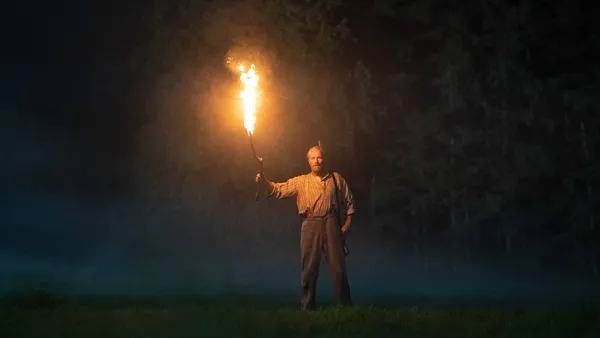 |
| The Last Front |
Director Julien Hayet-Kerknawi's war film, The Last Front, is set in a small Belgian village during the first days of World War I. Widower Leonard Lambert (Iain Glen) tends his farm and looks after his children. Tension mounts between him and his son, Adrien (James Downie), who has entered into a love affair with Louise Janssen (Sasha Luss), a young woman outside of his social class. Leonard warns him that he's asking Louise to make the same sacrifice his mother made, and stresses the hardship of life on a farm that grinds a woman down. He pleads with Adrien to let her go, but the pair are committed to one another. Meanwhile, two German officers, a father (Philippe Brenninkmeyer) and son (Joe Anderson), are locked in their own tense relationship, and when the two families cross paths, the impulsive young men ignite a spark that engulfs Leonard, his family and the village in a bloody struggle.
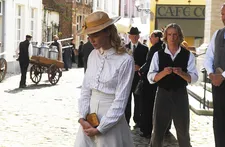 |
| The Last Front |
The Last Front, co-written by Kate Wood, is Hayet-Kerknawi's feature début, but continues an interest in World War I which he explored in his short film A Broken Man (2015). Both the feature and short film explore the impact of war on human beings, and the injustice that is borne out of war.
In conversation with Eye For Film, Hayet-Kerknawi and Iain Glen discussed how war is an aberration against nature, the reluctance to divide characters along moral lines, and the emphasis on emotion.
Paul Risker: For you, Julien, what did Iain bring to the film and the character that surprised you? And for you, Iain, from first reading the script to now, is there anything that surprises you about the film?
Iain Glen: From your side of the camera you never quite know how a film is going to visually look when finished. I'm not a great looker at monitors - I trust the people who are making the film. So, I was blown away by the poetic visuals of the piece after I saw it.
There are some sequences where no dialogue is necessary, and the storytelling is very finely managed through the visuals. It's a world in which great peacefulness, serenity and beauty are destroyed brutally and that's told incredibly well through the visuals. And, throughout the film, it's peppered with these moments where you get the [feel for the] rhythm of the countryside and rural life.
So, that was one aspect of it and Julien will not mind me saying that it's always a slight leap into the unknown when you work with first-time directors. You don't quite know what's going to happen, and I was reassured by the script. That told me he had a profound knowledge of the space and the story he wanted to tell. But I was surprised by the sureness of his touch in terms of how he wanted to tell the story.
Julien Hayet-Kerknawi […] This story is about a peaceful farmer and his transition to becoming a hero - it's a hero's journey. He's an unlikely everyman who, under pressure, decides to radically intervene. The first time that Iain and I were on set together was the shot that was in the trailer, where he's running with the rifle through the alley. It was in the middle of his journey and when I saw that first scene we shot with him, it was the first visual confirmation that this was a match made in heaven.
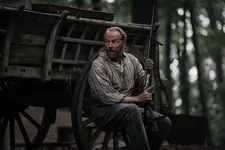 |
| The Last Front |
What I really appreciate about Iain is how he was able to show an extreme vulnerability in the character, but when things turned horribly, I believed the way that he suddenly took up the responsibility to defend people in a lawless world.
PR: It's important to see Leonard's gentleness, vulnerability and moral conscience because there's a poetic side to the film. This is expressed verbally and visually, especially in Leonard's spiritual moments. The Last Front is about the meeting point between light and dark, beauty and ugliness, and when you can get into the grey it makes everything feel sincerer.
IG: I think that's right and even my character's nemesis is placed in their own family context. There's great emotional disappointment there and misunderstanding. There's a desire from one side to try and be honourable and proper, and it's very easy to underestimate how terrifying war is, whether you're carrying a gun, or you think you're being shot at. In war films, things can become a bit plot heavy, about where the story is going to end up, but this film is very emotional, and it's really about people and how war affects human beings.
It's a question as pertinent and valid today as it ever was, sadly, and that's the loss. Whatever any leader will tell you about a piece of land they're trying to gain, at the end of the day, war is about people losing their lives and the places they love - their lives are torn apart. So, it's human things that are dealt with, as you say, on a full spectrum. It's not black and white, it's right across that spectrum.
JHK: That also brings up the importance of nature in the film. My goal was to depict war as an aberration against nature and humanity. You can say war is a crime against humanity, but what if you can take it further and say it's a crime against nature?
At the beginning of the movie, there's a lovely little moment where Ian's character is having an argument with his son under this massive tree. It takes up 90% of the screen and the characters are cast as very small.
PR: I'm deeply troubled by the disconnect human beings show towards nature and the permanent scars we've left on the landscape, and the human suffering as a consequence.
JHK: This is also what was interesting about the world The Last Front takes place in. The movie is set the week before World War One - a lot of films are set in the middle of the war, in the trenches or at its end. What I wanted to do was see what the world looked like right on the edge. This is why we also shot it with vintage lenses and cameras, to give the film an old-world charm, and to rely on its authenticity, but we also polished it so that it looked very slick.
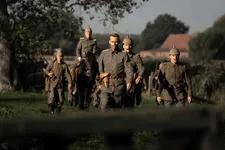 |
| The Last Front |
[…] One might wonder why we focus for half an hour on a love story. Well, that was very intentional. In the first 15 minutes, everything is about family but when the family structure breaks, the film fades to black - it's a totally different movie from then on. It is then about the war and only then did we start seeing the villages and the bigger conflict.
It's also interesting to watch The Last Front alongside a film set at the end of the First World War, to see how that world evolved in four years and became brutal like a machine. It's not a world I'd have wanted to be part of.
PR: To compare the two fathers and their sons is not a neat and tidy comparison, but I'd argue it's at the core of any critique of the film.
IG: I think you're absolutely right, and I do think those father and son relationships trigger the biggest moments in the film in lots of ways. Leonard's relationship with Adrian is not unusual, certainly for that period. Again, it's subtle, and it doesn't dominate the film, but there's class society and the aspirations to either move out of it or how Adrien is perceived to be trying to move out of it.
There's a very sweet and innocent love between two young people, and again, without it being overstated, you get to know about Leonard's past and the complications with his wife, who is no longer there. He's trying to be a father on his own and again, on the German side, there's a father on his own.
Everything is through the eye of what you hope are personal relationships that people can readily relate to. Wherever you go back in time, it might be very different, but I don't think rural life has changed so massively around the world. Rural life doesn't change as much as urban city life, which is always keeping right up with the latest technology.
I hope there's an availability to the relationships that will hook people into the film. I've got three kids, and there's so much in there that I could certainly use in relationships with my children.
JHK: The movie is about a father and son on the good side of the classic black and white [moral divide]. Leonard's character is good, but the Germans aren't bad. When you enter the movie, there are a lot of nuances, and you see that a human is never 100% evil, just as he's not 100% good, especially when war turns us all into animals.
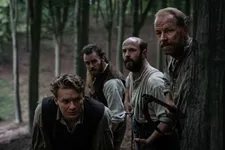 |
| The Last Front |
What I wanted to play with in the script is a father and son on one side and a father and son on the other side. And if the son and father on opposite sides are in conflict, how does that push and pull at the dynamics of the other two characters?
I didn't want to write a war picture where it was all factually based. We were exploring how events played out, and I just wanted to create a world you feel through with the characters. When you're hooked on those characters, then you have something like pure cinema, where you might not have a lot of historical facts, but you're feeling something - how a village is in distress, people have to hide at the last minute, and they don't know what's going on.
The Last Front is released theatrically in the US on 9 August, by Enigma Releasing.





















